现代大学英语精读第一册
现代大学英语精读(第二版)第一册课后练习答案(全册)
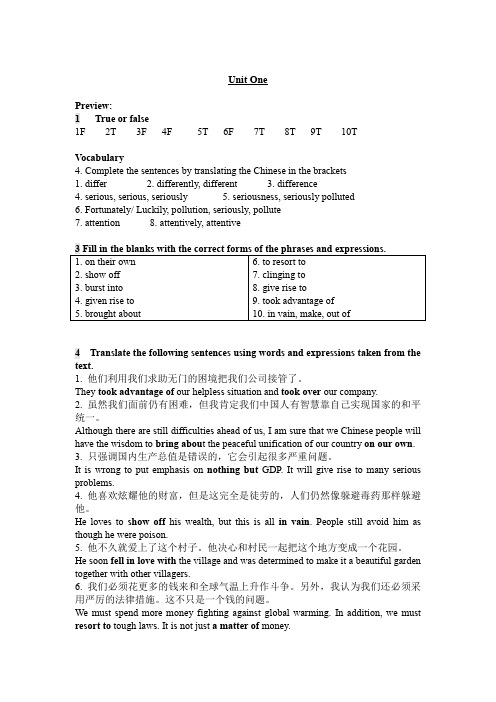
Unit OnePreview:1 True or false1F 2T 3F 4F 5T 6F 7T 8T 9T 10TVocabulary4. Complete the sentences by translating the Chinese in the brackets1. differ2. differently, different3. difference4. serious, serious, seriously5. seriousness, seriously polluted6. Fortunately/ Luckily, pollution, seriously, pollute7. attention 8. attentively, attentive4 Translate the following sentences using words and expressions taken from the text.1. 他们利用我们求助无门的困境把我们公司接管了。
They took advantage of our helpless situation and took over our company.2. 虽然我们面前仍有困难,但我肯定我们中国人有智慧靠自己实现国家的和平统一。
Although there are still difficulties ahead of us, I am sure that we Chinese people will have the wisdom to bring abou t the peaceful unification of our country on our own.3. 只强调国内生产总值是错误的,它会引起很多严重问题。
It is wrong to put emphasis on nothing but GDP. It will give rise to many serious problems.4. 他喜欢炫耀他的财富,但是这完全是徒劳的,人们仍然像躲避毒药那样躲避他。
外研社版现代大学英语精读课件第一册l

02
Safety procedures
Instruct students on the correct procedures to follow in case of an emergency, including evacuation routes and safety equipment usage.
05 Summary and Reflection
Key points learned in this lesson
Language Features
This lesson introduced key language features of English, including sentence structure, vocabulary usage, and grammar rules.
The article includes several important phrases that are essential for understanding the concepts discussed, such as "constructivist approach" and " flipped classroom model ".
详细描述:课程注重写作技能的培养,通过写作任务和范文分析,指导学生掌握不同类型的写作技巧,如说明文、议论文、 记叙文等。同时强调写作逻辑和语言表达的准确性。
Reading comprehension strategies
总结词:策略培养
详细描述:该课程注重阅读理解策略的培养,教授学生如何通过略读、扫读、精读等不同阅读方法, 快速理解文章主旨和细节,提高阅读效率。同时通过阅读不同类型的文章,培养学生的阅读兴趣和习 惯。
现代大学英语精读1(第三版)教师用书Unit1

现代大学英语精读1(第三版)教师用书Unit1:走进英语学习的奇妙世界一、教学目标1. 帮助学生掌握本单元的核心词汇和短语,提高英语表达能力。
2. 引导学生理解课文内容,培养阅读理解能力。
3. 通过课文学习,激发学生对英语国家文化的兴趣。
4. 培养学生运用英语进行思考和讨论的能力。
二、教学内容1. 词汇:本单元涉及约50个核心词汇,包括生活、学习、工作等场景的高频词汇。
2. 短语:学习10个常用短语,帮助学生更好地表达自己的想法。
3. 课文:解读课文《A Good Beginning》,让学生了解英语学习的乐趣和方法。
4. 文化背景:介绍英语国家的教育体制,拓宽学生视野。
三、教学步骤1. 导入:以趣味话题引入本单元主题,激发学生兴趣。
2. 词汇讲解:结合实例,讲解核心词汇的用法和搭配。
3. 短语学习:通过情景模拟,让学生在实际语境中掌握短语用法。
4. 课文解读:带领学生分析课文结构,理解文章主旨。
5. 文化拓展:分享英语国家的教育趣事,让学生感受异国文化。
6. 讨论环节:组织学生就课文内容展开讨论,提高英语口语表达能力。
7. 作业布置:巩固所学知识,为下一节课做好准备。
四、教学建议1. 针对不同水平的学生,适当调整教学难度和进度。
2. 创设生动、有趣的教学情境,提高学生的学习积极性。
3. 注重培养学生的自主学习能力,鼓励学生课外阅读英语文章。
4. 定期进行课堂互动,关注学生的发音、语法等细节问题。
5. 结合实际生活,让学生在实践中感受英语的魅力。
五、教学方法1. 互动式教学:采用提问、小组讨论等形式,让学生在互动中学习,提高课堂参与度。
2. 情境模拟:通过角色扮演、情景对话等方式,让学生在真实语境中运用所学知识。
3. 任务驱动:设计一系列学习任务,引导学生主动探索、解决问题,培养解决问题的能力。
4. 多媒体辅助:利用音频、视频等资源,丰富教学手段,提高学生的学习兴趣。
六、课堂活动设计1. 词汇接龙:让学生轮流用本单元学到的词汇进行接龙,巩固记忆。
现代大学英语精读1

现代大学英语精读1《现代大学英语精读1》是一本为大学生所编写的英语教材,它涵盖了各种主题的文章和相关练习,旨在提高学生的阅读理解能力和英语表达能力。
本教材的主要内容包括以下几个方面。
首先,本教材包含了一系列的短篇文章,涵盖了社会、文化、科技、经济等各个领域的话题。
这些文章既有来自报纸、杂志的报道,也有专门为本教材编写的原创文章,旨在帮助学生了解和掌握各种领域的英语表达方式和专业知识。
通过阅读这些文章,学生可以提高他们的阅读理解能力,并学习到一些新的词汇和表达方式。
其次,本教材还包含了一些常见的阅读题型,并提供了相关的答案和解析。
这些题型包括主旨理解、细节理解、推理判断、词汇理解等,旨在帮助学生全面了解文章的内容和作者的观点。
通过完成这些练习,学生可以提高他们的阅读理解能力和分析问题的能力,培养他们的批判性思维和判断力。
此外,本教材还提供了一些和文章内容相关的讨论话题和写作练习。
通过参与这些讨论和写作,学生可以提高他们的口头表达和写作能力,培养他们的思维逻辑和语言组织能力。
这些练习也帮助学生加深对文章内容的理解,并从中得到一些新的观点和思考。
最后,本教材还提供了一些相关的文化背景知识和学习方法。
在学习英语的过程中,了解英语国家的历史、文化和社会背景是非常重要的。
本教材通过提供一些与文章话题相关的文化背景知识,帮助学生更好地理解文章的内容和作者的观点。
此外,本教材还提供了一些学习方法和学习技巧,帮助学生更高效地学习英语,提高他们的学习自觉性和学习能力。
总的来说,作为一本英语教材,《现代大学英语精读1》通过丰富的文章内容、多样的阅读题型和实用的学习方法,帮助大学生提高他们的阅读理解能力、英语表达能力和批判性思维能力,从而更好地适应大学学习和未来的职业发展。
现代大学英语精读1第2版

现代大学英语精读1第2版作者介绍《现代大学英语精读1第2版》的作者是潘鸿吉和陈欣,是中国人民大学出版社于2010年出版的一部教材。
潘鸿吉,现代大学英语教育专家,多次参与《大学英语教学大纲》的修订工作。
陈欣,中国人民大学外国语学院外籍语言学教师,拥有丰富的教学经验。
书籍概述《现代大学英语精读1第2版》是大学英语教材中的一本重要教材,旨在提高学生的听说读写四个方面的能力。
该教材包含了丰富的英语学习资源,适用于英语专业的大学本科生使用。
教材结构《现代大学英语精读1第2版》分为15个单元,每个单元分为两个部分:课文学习和语言点学习。
课文学习部分包括真实生活情境和有趣的话题,旨在提高学生的听力和阅读能力。
语言点学习部分介绍了课文中出现的关键语法和词汇知识,以帮助学生更好地理解和运用课文内容。
教材还附带了相关的听力练习、阅读理解题和写作练习,帮助学生巩固所学知识并提升他们的实际应用能力。
另外,教材还提供了课后习题答案和录音文本供学生自我检查和学习。
此外,教材还配有配套网站和多媒体资源,学生可以通过这些资源进行在线学习和练习。
适用人群《现代大学英语精读1第2版》适用于英语专业的大学本科生使用,也可供其他英语学习者参考。
教材以培养学生的英语综合运用能力为目标,旨在帮助学生提高听说读写四个方面的能力。
学习目标通过学习《现代大学英语精读1第2版》教材,学生将能够:1.提高英语听力理解能力,包括听取真实生活情境下的对话和讲座等;2.提高英语阅读理解能力,包括阅读各种文本材料并理解其主旨和细节;3.掌握与课文有关的语法和词汇知识,以便正确理解和运用课文内容;4.运用所学知识进行口头和书面表达,包括参与英语对话和写作练习。
教学方法《现代大学英语精读1第2版》采用了多种教学方法,以提高学生的英语学习效果。
以下是几种常用的教学方法:1.情境教学法:通过创设真实的生活情境来激发学生的兴趣,并帮助他们将所学的语言知识应用到实际生活中。
现代大学英语精读1-4册大纲及教案

现代大学英语精读1-4册大纲及教案现代大学英语精读1-4册大纲及教案一、教材概述《现代大学英语精读》是中国大学英语教学研究会主编的一套综合性教材,共分为1-4册,用于高校本科英语专业或非英语专业学生的英语阅读教学。
该教材的目标是培养学生的阅读能力,提升其英语交流和写作能力。
二、教学目标1. 培养学生对英语文章的阅读理解能力;2. 培养学生的英语写作能力,使其能够进行英文写作;3. 培养学生的英语听力和口语能力,提高其英语交流能力;4. 培养学生的独立学习能力,提高其自主学习能力。
三、教学内容与安排1. 《现代大学英语精读1》本册共10个单元,包括文章阅读、词汇训练、听力训练和口语训练,旨在帮助学生提高阅读理解能力和听说能力。
每个单元包括以下教学内容:- 预习导入:通过复习所学词汇和引入相关话题,激发学生学习的兴趣;- 文章阅读:学生阅读一篇有关话题的文章,并回答相关问题,培养其阅读理解能力;- 词汇训练:帮助学生学习文章中的生词和短语,并进行相关的词汇练习;- 听力训练:提供与文章话题相关的听力材料,让学生提高听力理解能力;- 口语训练:通过对话和口语练习,训练学生的口语表达能力。
2. 《现代大学英语精读2》本册共12个单元,内容包括了不同主题的文章阅读、词汇练习、听力练习和口语训练。
教学内容安排如下:- 预习导入:导入本单元的主题,激发学生兴趣;- 文章阅读:学生阅读一篇较长的英语文章,并回答相关问题,提高理解能力;- 词汇训练:学习并掌握文章中的生词和短语,进行词汇练习;- 听力训练:提供与文章话题相关的听力材料,训练学生的听力理解能力;- 口语训练:通过对话和口语练习,提高学生的口语表达能力。
3. 《现代大学英语精读3》本册共10个单元,每个单元都包括了与不同主题相关的文章阅读、词汇练习、听力练习和口语训练。
教学内容安排如下:- 预习导入:引入本单元的话题,激发学生学习的兴趣;- 文章阅读:学生阅读一篇相关主题的英语文章,提高其阅读理解能力;- 词汇训练:学习文章中的生词和短语,进行词汇练习;- 听力训练:提供与文章话题相关的听力材料,训练学生的听力理解能力;- 口语训练:通过对话和口语练习,训练学生的口语表达能力。
现代大学英语精读1 (第三版)教师用书

现代大学英语精读1 (第三版)教师用书1. 引言在现代社会中,英语作为国际语言具有重要的地位。
作为一门重要的外语课程,大学英语精读在大学教学中扮演着重要的角色。
本教师用书是《现代大学英语精读1 (第三版)》的配套教材,旨在帮助教师更好地组织课堂教学,提高学生的英语阅读能力。
2. 教材目标本教材旨在培养学生的英语阅读能力,使学生能够通过阅读各种文本来获取信息,并在阅读过程中理解和分析文本的主旨、目的和观点。
同时,本教材还旨在提高学生的词汇量和语法运用能力。
通过学习本教材,学生将能够更好地理解和运用英语,为今后的学习和工作打下良好的基础。
3. 教学方法与策略为了达到教材的目标,教师可以采用以下的教学方法和策略:•翻译对比法: 将教材中的英文文本与中文翻译进行对比,帮助学生理解词汇和句法结构的用法;•讨论与演练:鼓励学生就文本内容进行讨论和演练,提高他们的分析和解读能力;•词汇拓展:在教学中加入相关的词汇拓展,帮助学生扩大词汇量;•多媒体辅助:利用多媒体资源,如音频和视频,提供丰富的语言输入,激发学生的学习兴趣;•提供案例:提供真实的案例和情境,让学生将所学知识应用到实际情境中;•鼓励阅读:鼓励学生多读英文原著和其他相关英文资料,培养他们的阅读兴趣和能力。
4. 教学内容本教材共分为12个单元,每个单元包含一个主题。
每个单元的教学内容主要包括以下几个方面:•文本阅读:学生通过阅读一篇或多篇相关的英文文本来获取信息,理解文本的主旨和要点;•词汇学习:教师通过解读课文中的生词和短语,帮助学生扩大词汇量;•语法解析:教师对课文中的语法结构进行解析和讲解,帮助学生理解语法的用法;•阅读策略:教师指导学生运用不同的阅读策略,如推测词义、猜测语境等,提高他们的阅读技巧;•文化背景:教师通过介绍相关的文化背景知识,帮助学生更好地理解课文的内容和意义。
5. 教学评估与考核为了科学评估学生的学习成果,教师可以采用以下的评估方式:•课堂参与:评估学生在课堂上的积极参与程度和表达能力;•作业批改:对学生的阅读作业进行批改,评估他们的阅读理解能力;•小组讨论:组织学生进行小组讨论,评估他们的分析和解释能力;•期末考试:以笔试形式,对学生的英语阅读能力进行综合评估。
现代大学英语 精读1 unit 1
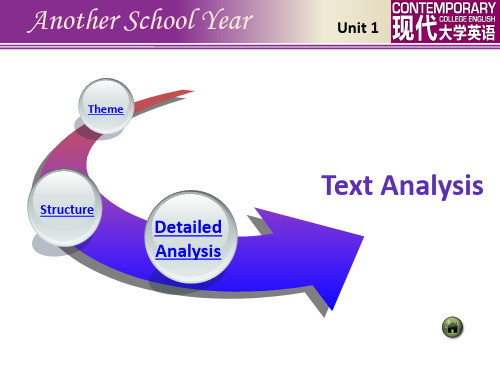
Text Analysis
Detailed Analysis
Part I: Sentence Paraphrase
They will be your income, and may it always suffice. (Para. 5)
Inverted sentence
May: in formal English, “may” is used in a blessing to express a hope or wish. e.g.
• the two-fold purpose of university education
Text Analysis
Detailed Analysis
Part I: Main Idea
Retell the teacher’s encounter with the student. Occasion, student’s appearance & question, what the teacher has in mind and what he says, student’s response What is the student’s attitude towards reading Shakespeare and towards the teacher? Find textual evidence. What is the teacher’s attitude towards the student? Find textual evidence. How does the teacher try to explain to the student the importance of reading literature? How do you understand the teacher’s differentiation of the three eight hours and his emphasis on the last third besides work and sleep?
现代大学英语精读第二版_第一册_课文翻译
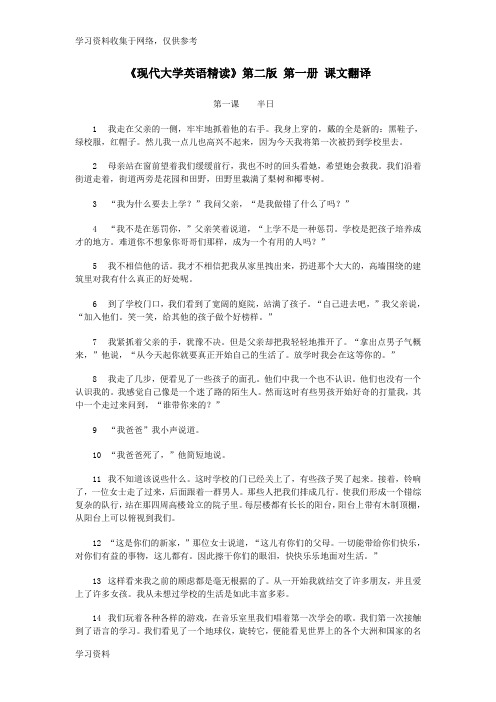
《现代大学英语精读》第二版第一册课文翻译第一课半日1我走在父亲的一侧,牢牢地抓着他的右手。
我身上穿的,戴的全是新的:黑鞋子,绿校服,红帽子。
然儿我一点儿也高兴不起来,因为今天我将第一次被扔到学校里去。
2母亲站在窗前望着我们缓缓前行,我也不时的回头看她,希望她会救我。
我们沿着街道走着,街道两旁是花园和田野,田野里栽满了梨树和椰枣树。
3“我为什么要去上学?”我问父亲,“是我做错了什么了吗?”4“我不是在惩罚你,”父亲笑着说道,“上学不是一种惩罚。
学校是把孩子培养成才的地方。
难道你不想象你哥哥们那样,成为一个有用的人吗?”5我不相信他的话。
我才不相信把我从家里拽出来,扔进那个大大的,高墙围绕的建筑里对我有什么真正的好处呢。
6到了学校门口,我们看到了宽阔的庭院,站满了孩子。
“自己进去吧,”我父亲说,“加入他们。
笑一笑,给其他的孩子做个好榜样。
”7我紧抓着父亲的手,犹豫不决。
但是父亲却把我轻轻地推开了。
“拿出点男子气概来,”他说,“从今天起你就要真正开始自己的生活了。
放学时我会在这等你的。
”8我走了几步,便看见了一些孩子的面孔。
他们中我一个也不认识。
他们也没有一个认识我的。
我感觉自己像是一个迷了路的陌生人。
然而这时有些男孩开始好奇的打量我,其中一个走过来问到,“谁带你来的?”9“我爸爸”我小声说道。
10“我爸爸死了,”他简短地说。
11我不知道该说些什么。
这时学校的门已经关上了,有些孩子哭了起来。
接着,铃响了,一位女士走了过来,后面跟着一群男人。
那些人把我们排成几行。
使我们形成一个错综复杂的队行,站在那四周高楼耸立的院子里。
每层楼都有长长的阳台,阳台上带有木制顶棚,从阳台上可以俯视到我们。
12“这是你们的新家,”那位女士说道,“这儿有你们的父母。
一切能带给你们快乐,对你们有益的事物,这儿都有。
因此擦干你们的眼泪,快快乐乐地面对生活。
”13这样看来我之前的顾虑都是毫无根据的了。
从一开始我就结交了许多朋友,并且爱上了许多女孩。
现代大学英语精读1课本内容及翻译

现代大学英语精读1课本内容及翻译Lesson One Half a DayNaguib Mahfous1. I walked alongside my father, clutching his right hand. All my clothes were new: the black shoes, the green school uniform, and the red cap. They did not make me happy, however, as this was the day I was to be thrown into school for the first time.2. My mother stood at the window watching our progress, and I turned towards her from time to time, hoping she would help.We walked along a street lined with gardens, and fields planted with crops: pears, and date palms.3. "Why school ?" I asked my father. "What have I done ?"4. "I'm not punishing you, " he said, laughing. "School's nota punishment. It's a place that makes useful men out of boys.Don' t you want to be useful like your brothers?"5. I was not convinced. I did not believe there was really any good to be had in tearing me away from my home and throwing me into the huge, high-walled building.6. When we arrived at the gate we could see the courtyard, vast and full of boys and girls. "Go in by yourself, " said my father, "and join them. Put a smile on your face and be a good example to others. "7. I hesitated and clung to his hand, but he gently pushed me from him. "Be a man, " he said. "Today you truly begin life.You will find me waiting for you when it's time to leave. "8. I took a few steps. Then the faces of the boys and girls came into view. I did not know a single one of them, and none of them knew me. I felt I was a stranger who had lost his way.But then some boys began to glance at me in curiosity, and one of them came over and asked, "Who brought you?"9. "My father, " I whispered.10. "My father's dead, " he said simply.11. I did not know what to say. The gate was now closed. Some of the children burst into tears. The bell rang. A lady came along, followed by a group of men. The men began sorting us into ranks. We were formed into an intricate pattern in the great courtyard surrounded by high buildings; from each floor we were overlooked by a long balcony roofed in wood.12. "This is your new home, "said the woman. "There are mothers and fathers here, too. Everything that is enjoyable and beneficial is here. So dry your tears and face life joyfully. "13. Well, it seemed that my misgivings had had no basis. From the first moments I made many friends and fell in love with many girls. I had never imagined school would have this rich variety of experiences.14. We played all sorts of games. In the music room we sang our first songs. We also had our first introduction to language.We saw a globe of the Earth, which revolved and showed the various continents and countries. We started learning numbers, and we were told the story of the Creator of the universe. We ate delicious food, took a little nap, and woke up to go on with friendship and love, playing and learning.15. Our path, however, was not totally sweet and unclouded. We had to be observant and patient. It was not all a matter of playing and fooling around. Rivalries could bring about pain and hatred or give rise to fighting. And while the lady would sometimes smile, she would often yell and scold. Even more frequently she would resort to physical punishment.16. In addition, the time for changing one' s mind was over and gone and there was no question of ever returning to the paradise of home. Nothing lay ahead of us but exertion, struggle, and perseverance. Those who were able took advantage of the opportunities for success and happiness that presented themselves.17. The bell rang, announcing the passing of the day and the end of work. The children rushed toward the gate, which was opened again. I said goodbye to friends and sweethearts and passed through the gate. I looked around but found no trace of my father, who had promised to be there. I stepped aside to wait. When I had waited for a long time in vain, I decided to return home on my own. I walked a few steps, then came to a startled halt. Good Lord! Where was the street lined with gardens? Where had it disappeared to? When did all these cars invade it? And when did all these people come to rest on its surface? How did these hills of rubbish find their way to cover its sides? And where were the fields that bordered it? High buildings had taken over, the street was full of children, and disturbing noises shook the air. Here and there stood conjurers showing off their tricks or making snakes appear from baskets. Then there was a band announcing the opening of a circus, with clowns and weight lifters walking in front.18. Good God! I was in a daze. My head spun. I almost went crazy. How could all this have happened in half a day, between early morning and sunset? I would find the answer at home with my father. But where was my home? I hurried towards the crossroads, because I remembered that I had to cross the street to reach our house, but the stream of cars would not let up.Extremely irritated, I wondered when I would be able to cross.19. I stood there a long time, until the young boy employed at the ironing shop on the corner came up to me.20. He stretched out his arm and said, "Grandpa, let me take you across."第一课半日1我走在父亲的一侧,牢牢地抓着他的右手。
现代大学英语精读1(第三版)教师用书Unit1
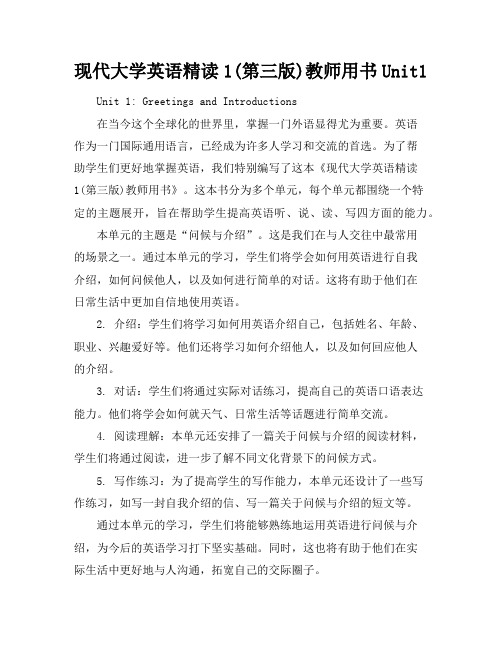
现代大学英语精读1(第三版)教师用书Unit1 Unit 1: Greetings and Introductions在当今这个全球化的世界里,掌握一门外语显得尤为重要。
英语作为一门国际通用语言,已经成为许多人学习和交流的首选。
为了帮助学生们更好地掌握英语,我们特别编写了这本《现代大学英语精读1(第三版)教师用书》。
这本书分为多个单元,每个单元都围绕一个特定的主题展开,旨在帮助学生提高英语听、说、读、写四方面的能力。
本单元的主题是“问候与介绍”。
这是我们在与人交往中最常用的场景之一。
通过本单元的学习,学生们将学会如何用英语进行自我介绍,如何问候他人,以及如何进行简单的对话。
这将有助于他们在日常生活中更加自信地使用英语。
2. 介绍:学生们将学习如何用英语介绍自己,包括姓名、年龄、职业、兴趣爱好等。
他们还将学习如何介绍他人,以及如何回应他人的介绍。
3. 对话:学生们将通过实际对话练习,提高自己的英语口语表达能力。
他们将学会如何就天气、日常生活等话题进行简单交流。
4. 阅读理解:本单元还安排了一篇关于问候与介绍的阅读材料,学生们将通过阅读,进一步了解不同文化背景下的问候方式。
5. 写作练习:为了提高学生的写作能力,本单元还设计了一些写作练习,如写一封自我介绍的信、写一篇关于问候与介绍的短文等。
通过本单元的学习,学生们将能够熟练地运用英语进行问候与介绍,为今后的英语学习打下坚实基础。
同时,这也将有助于他们在实际生活中更好地与人沟通,拓宽自己的交际圈子。
现代大学英语精读1(第三版)教师用书Unit1Unit 1: Greetings and Introductions在本单元的学习中,我们将探讨如何以自然、流畅的方式用英语进行问候与介绍。
通过一系列精心设计的活动和练习,学生们将逐步提高他们的英语交际能力。
我们将关注如何在不同场合下恰当地使用问候语。
例如,在正式场合,如商务会议或学术交流中,使用“Goodmorning/afternoon/evening”会更加得体;而在朋友聚会或休闲场合,简单的“Hi”或“Hello”就足够了。
现代大学英语精读1lesson1halfaday
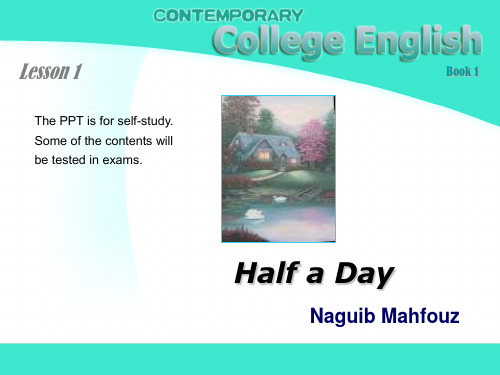
The end of Creator of the Universe.
Christians believe that the
world was created by God. So here “Creator 〞 means God.
Lesson 1 – Half a Day
To be continued on the next page.
The University of Cairo
Lesson 1 – Half a Day
The end of Author.
II. His works
Naguib Mahfouz was the first Arab to win the Nobel prize for literature, in 1988. He has been described as "a Dickens of the Cairo cafés" and "the Balzac of Egypt". He is now the author of no fewer than 30 novels, more than 100 short stories, and more than 200 articles. Half of his novels have been made into films which have circulated throughout the Arabic-speaking world.
To be continued on the next page.
Lesson 1 – Half a Day
Lesson 1 – Half a Day
现代大学英语(第二版)精读1
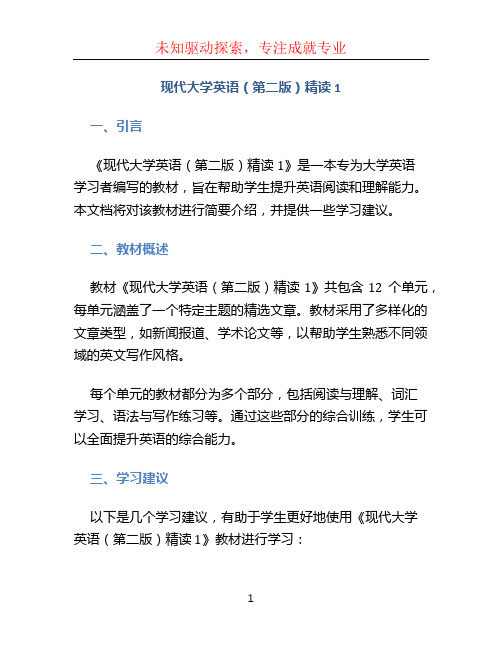
现代大学英语(第二版)精读1一、引言《现代大学英语(第二版)精读1》是一本专为大学英语学习者编写的教材,旨在帮助学生提升英语阅读和理解能力。
本文档将对该教材进行简要介绍,并提供一些学习建议。
二、教材概述教材《现代大学英语(第二版)精读1》共包含12个单元,每单元涵盖了一个特定主题的精选文章。
教材采用了多样化的文章类型,如新闻报道、学术论文等,以帮助学生熟悉不同领域的英文写作风格。
每个单元的教材都分为多个部分,包括阅读与理解、词汇学习、语法与写作练习等。
通过这些部分的综合训练,学生可以全面提升英语的综合能力。
三、学习建议以下是几个学习建议,有助于学生更好地使用《现代大学英语(第二版)精读1》教材进行学习:1. 务必完成阅读与理解部分阅读与理解部分是教材的核心部分,它旨在帮助学生提升阅读和理解能力。
建议学生在阅读文章之前先浏览题目和问题,以有针对性地阅读。
同时,学生应仔细阅读文章并尝试回答相应的问题。
2. 注重词汇学习在教材中,词汇学习部分提供了文章中重要词汇的释义和例句,学生应该仔细阅读并复习这些内容。
此外,建议学生使用词汇表积累生词,并进行反复操练,以加深记忆。
3. 利用语法和写作练习部分语法和写作练习部分可以帮助学生巩固所学的语法知识,并提高写作能力。
学生应认真完成这一部分的练习题,并积极参与写作讨论。
4. 多做阅读练习除了教材中的文章,学生还可以选择其他相关英文文章进行阅读练习。
阅读不同主题和领域的文章可以帮助学生拓宽知识面,并提高阅读速度和理解能力。
四、总结《现代大学英语(第二版)精读1》是一本优秀的英语教材,适用于大学英语学习者。
通过认真阅读和练习,学生可以提高英语阅读和理解能力,并加深对语法和写作的理解。
希望以上学习建议能对学生在使用该教材时有所帮助。
现代大学英语精读lesson1
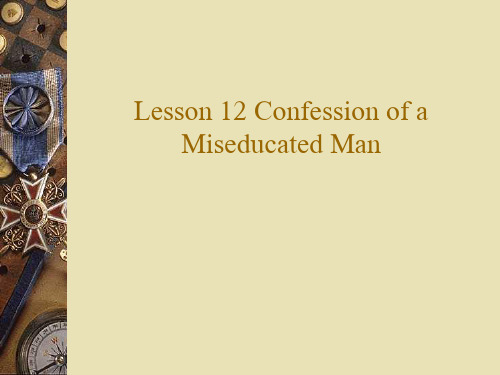
Hanging and wiving go by destiny: some people are fated to marry each other, just as some are fated to be hanged
we must all be re-educated so that we will be able to understand that there are more similarities than differences among people. The differences are superficial and in significant whereas the similarities are essential and fundamental.
13.confession
1) a formal statement that you have done sth embarrassing, wrong or illegal: a ~ of murder / At 3 a.m. Jake broke down and made a full ~.
comprehend v. 1. understand fully eg. I cannot comprehend now you could have been so stupid.
4. Some vocabulary concerned:
Galaxy Solar system Milky Way Star Planet Satellite Comet Meteor Horoscope
现代大学英语精读1课后答案
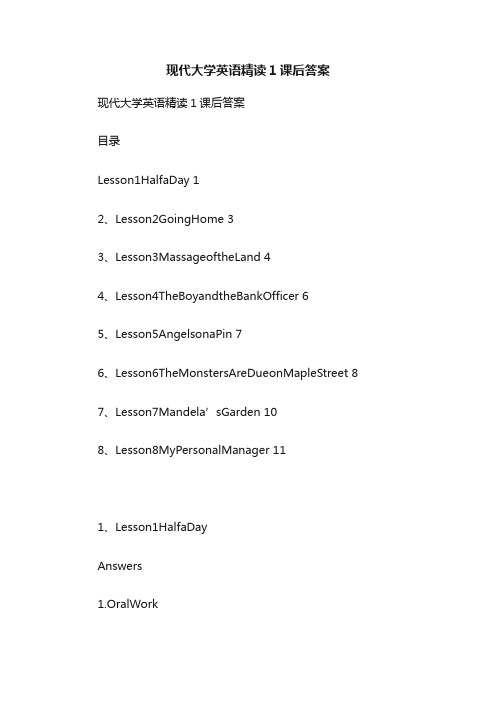
现代大学英语精读1课后答案现代大学英语精读1课后答案目录Lesson1HalfaDay 12、Lesson2GoingHome 33、Lesson3MassageoftheLand 44、Lesson4TheBoyandtheBankOfficer 65、Lesson5AngelsonaPin 76、Lesson6TheMonstersAreDueonMapleStreet 87、Lesson7Mandela’sGarden 108、Lesson8MyPersonalManager 111、Lesson1HalfaDayAnswers1.OralWork1)Whatdidhisfathersaytogivehimcourage?Howdidtheboyfee lwhenhearrivedattheschoolgatewithhisfather?2)Whatdidtheboylearninschool?Canyounamesomeofthethin gshelearned?2.Vocabularytest1)choosetherightwordandputintheproperform:(1)hadreceived(2)affects(3)Admission(4)awake(5)beneath(6)on2)Putinthemissingwords.good-natured;hunt;drank;queer;asleep;woke;occurred;absence;portrait;replace.3.GrammarWorkPutintheblankswithcorrectverbforms.(1)wassurfingwascut;(2)willhaveplanted;(3)was;hadnotbeen;(4)hasbeenmarried;(5)is;willbe;(6)is;musthaverained4.WrittenWorkWritewhatyou’velearntfromthetextaboutthelittleboy’slifei nschoolinabout100words.5.Translation(1)也许所有教育最有价值的结果就是培养你有具有让你完成你不得不做的任何该做的事,不管你愿不愿意做.(2)教育就是能让我们不断地发现我们的无知.Lesson2GoingHomeAnswers1.Oralwork(1)Whatdoyouknowabouttheseyoungpeople?(2)Howdidtheyoungpeoplefeelwhentheyheardthestory?2.Vocabularytest1)choosetherightwordandputintheproperform:(1)across(2)rise(3)attend/takepartin(4)reach(5)since(6)above/below2)Putinthemissingwords.screaming;clenched;triumph;exaltation;except;stunned;misty;covered;ribbons;banner3.GrammarworkTranslation.(1)Nobodycouldtellwherethetreasurewashidden.(2)Thetrafficwillbeveryheavyontheroadduringtherushhourev eryday.(3)Hemayhavegivenheradvice,butIdoubtifitdoesheranygood.(4)Whatshelearnedatuniversityprovedusefulinherresearch.(5)Ifhehadwaitedforthetrafficlightstochange,hewouldnothav ebeenkilled.(6)IfnotIhadseenhimatthepartyyesterdayevening!4.WrittenWork略.5.Translation(1)多给人原谅比多去谴责(2)如果我们想要去爱,我们必须学会如何去原谅.Lesson3MassageoftheLandAnswers1.Oralwork(answersomitted)2.Vocabularytest(1)unfaithful(2)takeout(3)talkover(4)sendfor(5)sentaway(6)sendup2)Putthemissingwords(1)sick/ill(2)alone(3)out(4)phone(5)on(6)until(7)church(8)only(9)answered(10)needed (11)clever(12)save(13)bit(14)now3)Writethenumbersinwords.(1)Twohundredandeight(2)Onethousandfivehundred/fifteenhundred(3)Seventhousand,onehundredandtwenty-eight.(4)twodollarssix-five/twodollarsandsixty-fivecents.(5)fourth(6)twenty-first(7)thirtieth(8)onehalf,threequarters,fourfifths3.Grammarwork(answersomitted)4.WrittenWorkOnepossibleversion:Myparentswereborn,broughtupandmarriedonthisland.Theyh avebeenlivingtherethroughtheirlife.Theygotupatsunriseandretire dwiththeirchickens.Theyplantedandreapedriceandraisedafewgoa ts,cowsandchickenswhichcouldprovidewhattheyneededintheirda ilylife..However,thepieceoflandswasnolongerfertile,bleedingyear afteryear,likethem,gettingoldandexhausted.Thesoilwasnotdifficu lttotillwhentherewasalotofrain,butinabadyear,itwasnotonlythepl oughsthatbrokebuttheirhearts,too.Thefarmerlifeishardbutmypar entsareenjoyingit.Theycherishtheirlandandneverwanttoleaveit.5.Translation.1)家再贫寒,也没有任何地方能和它比。
现代大学英语精读1(带译文)

现代大学英语精读1(带译文)一、课文背景本单元选自美国作家埃德加·爱伦·坡的短篇小说《黑猫》。
故事讲述了一位酗酒成性的男子,因虐待并杀害自己收养的黑猫,最终被黑猫的鬼魂复仇,自己也在精神崩溃中走向毁灭。
这篇小说通过恐怖、悬疑的情节,揭示了人性的黑暗面和道德的沦丧。
二、课文概要1. 故事发生在美国一个偏远的农场,主人公是一位酗酒成性的男子。
他收养了一只黑猫,取名普卢托。
随着时间的推移,他对黑猫产生了强烈的依赖,甚至将它视为自己的朋友。
2. 有一天,男子在醉酒后用刀划伤了普卢托的左眼。
酒醒后,他为自己的行为感到愧疚,但为了掩盖罪行,他决定将黑猫埋在院子里。
3. 在黑猫被埋葬的当晚,男子听到了黑猫的哀嚎声。
他开始怀疑自己的行为,精神状态逐渐恶化。
4. 为了摆脱黑猫的纠缠,男子决定离开农场,搬到城里居住。
然而,他发现黑猫的鬼魂无处不在,甚至出现在他的新家中。
5. 最终,男子在精神崩溃中走向毁灭,被黑猫的鬼魂复仇。
三、课文难点解析1. 生词短语(1)酗酒成性:drunkard,意为“酒鬼”。
(2)虐待:torture,意为“折磨”。
(3)复仇:revenge,意为“报复”。
2. 句子结构(1)It was in the early part of the evening that I first became aware of the symptoms of my little trouble.本句中,It wasthat为强调句型,强调时间状语“in the early part of the evening”。
symptoms意为“症状”,指男子开始意识到自己的精神状态出现问题。
(2)I resolved to get rid of the cat at once.本句中,resolve to do sth. 意为“决定做某事”,get rid of意为“摆脱”。
男子决定立刻摆脱黑猫。
现代大学英语精读1
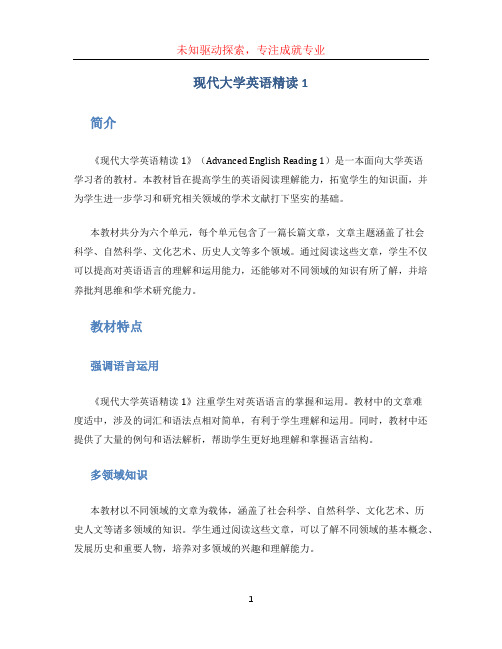
现代大学英语精读1简介《现代大学英语精读1》(Advanced English Reading 1)是一本面向大学英语学习者的教材。
本教材旨在提高学生的英语阅读理解能力,拓宽学生的知识面,并为学生进一步学习和研究相关领域的学术文献打下坚实的基础。
本教材共分为六个单元,每个单元包含了一篇长篇文章,文章主题涵盖了社会科学、自然科学、文化艺术、历史人文等多个领域。
通过阅读这些文章,学生不仅可以提高对英语语言的理解和运用能力,还能够对不同领域的知识有所了解,并培养批判思维和学术研究能力。
教材特点强调语言运用《现代大学英语精读1》注重学生对英语语言的掌握和运用。
教材中的文章难度适中,涉及的词汇和语法点相对简单,有利于学生理解和运用。
同时,教材中还提供了大量的例句和语法解析,帮助学生更好地理解和掌握语言结构。
多领域知识本教材以不同领域的文章为载体,涵盖了社会科学、自然科学、文化艺术、历史人文等诸多领域的知识。
学生通过阅读这些文章,可以了解不同领域的基本概念、发展历史和重要人物,培养对多领域的兴趣和理解能力。
提升阅读理解能力教材中的文章选取自真实的学术文献和著名作品,语言严谨、逻辑严密。
学生通过阅读这些文章,可以培养批判性思维和阅读理解能力,并通过理解隐含意思、分析论证过程等方式进行深度阅读。
建议的学习方法提前预习在每个单元开始学习之前,建议学生先对文章的主题进行预习。
可以先从标题、摘要和关键词入手,了解文章的基本内容和结构。
预习的目的是帮助学生在阅读时更好地理解文章,并提前了解相关领域的基本概念和术语,有助于增强阅读效果。
分段阅读对于较长的文章,建议学生进行分段阅读。
每次只阅读一个段落或一个小节,逐段理解文章的逻辑和论证过程。
在阅读过程中,学生可以用笔记记录重要观点和关键词,帮助理清文章的结构和思路。
多角度思考在阅读文章时,建议学生从不同角度思考问题。
可以提出自己的问题,比如作者的观点是否有力地支持了论点?文章中的证据是否充分可靠?通过多角度思考,可以培养批判性思维和分析能力,并提高阅读理解的深度和广度。
(完整word版)现代大学英语精读1课本内容及翻译
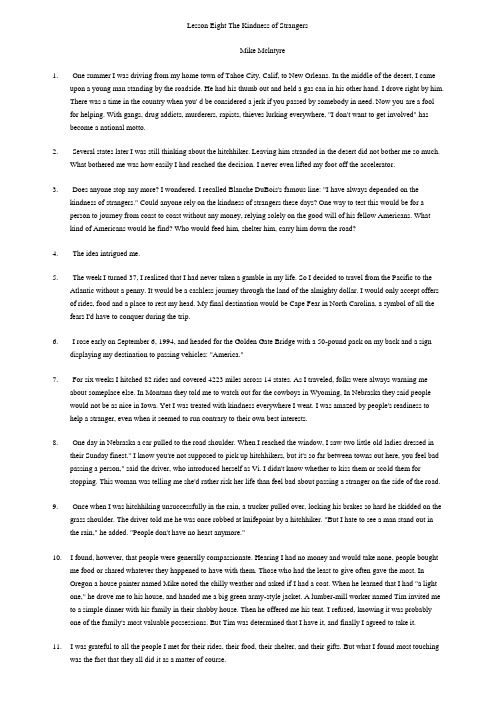
Lesson Eight The Kindness of StrangersMike Mclntyre1. One summer I was driving from my home town of Tahoe City, Calif, to New Orleans. In the middle of the desert, I cameupon a young man standing by the roadside. He had his thumb out and held a gas can in his other hand. I drove right by him.There was a time in the country when you' d be considered a jerk if you passed by somebody in need. Now you are a fool for helping. With gangs, drug addicts, murderers, rapists, thieves lurking everywhere, "I don't want to get involved" has become a national motto.2. Several states later I was still thinking about the hitchhiker. Leaving him stranded in the desert did not bother me so much.What bothered me was how easily I had reached the decision. I never even lifted my foot off the accelerator.3. Does anyone stop any more? I wondered. I recalled Blanche DuBois's famous line: "I have always depended on thekindness of strangers." Could anyone rely on the kindness of strangers these days? One way to test this would be for a person to journey from coast to coast without any money, relying solely on the good will of his fellow Americans. What kind of Americans would he find? Who would feed him, shelter him, carry him down the road?4. The idea intrigued me.5. The week I turned 37, I realized that I had never taken a gamble in my life. So I decided to travel from the Pacific to theAtlantic without a penny. It would be a cashless journey through the land of the almighty dollar. I would only accept offers of rides, food and a place to rest my head. My final destination would be Cape Fear in North Carolina, a symbol of all the fears I'd have to conquer during the trip.6. I rose early on September 6, 1994, and headed for the Golden Gate Bridge with a 50-pound pack on my back and a signdisplaying my destination to passing vehicles: "America."7. For six weeks I hitched 82 rides and covered 4223 miles across 14 states. As I traveled, folks were always warning meabout someplace else. In Montana they told me to watch out for the cowboys in Wyoming, In Nebraska they said people would not be as nice in Iowa. Yet I was treated with kindness everywhere I went. I was amazed by people's readiness to help a stranger, even when it seemed to run contrary to their own best interests.8. One day in Nebraska a car pulled to the road shoulder. When I reached the window, I saw two little old ladies dressed intheir Sunday finest." I know you're not supposed to pick up hitchhikers, but it's so far between towns out here, you feel bad passing a person," said the driver, who introduced herself as Vi. I didn't know whether to kiss them or scold them forstopping. This woman was telling me she'd rather risk her life than feel bad about passing a stranger on the side of the road.9. Once when I was hitchhiking unsuccessfully in the rain, a trucker pulled over, locking his brakes so hard he skidded on thegrass shoulder. The driver told me he was once robbed at knifepoint by a hitchhiker. "But I hate to see a man stand out in the rain," he added. "People don't have no heart anymore."10. I found, however, that people were generally compassionate. Hearing I had no money and would take none, people boughtme food or shared whatever they happened to have with them. Those who had the least to give often gave the most. In Oregon a house painter named Mike noted the chilly weather and asked if I had a coat. When he learned that I had "a light one," he drove me to his house, and handed me a big green army-style jacket. A lumber-mill worker named Tim invited me to a simple dinner with his family in their shabby house. Then he offered me his tent. I refused, knowing it was probably one of the family's most valuable possessions. But Tim was determined that I have it, and finally I agreed to take it.11. I was grateful to all the people I met for their rides, their food, their shelter, and their gifts. But what I found most touchingwas the fact that they all did it as a matter of course.12. One day I walked into the chamber of commerce in Jamestown, Tenn. to find out about camping in the area. The executivedirector, Baxter Wilson, 59, handed me a brochure for a local campground. Seeing that it cost $12, I replied, "No, that's all right. I'll try something else." Then he saw my backpack. "Most people around here will let you pitch a tent on their land, if that's what you want," he said. Now we're talking, I thought. "Any particular direction?" I asked. "Tell you what. I've got a big farm about ten miles south of here. If you're here at 5:30, you can ride with me."13. I accepted, and we drove out to a magnificent country house. Suddenly I realized he'd invited me to spend the night in hishome. His wife, Carol, a seventh-grade science teacher, was cooking a pot roast when we walked into the kitchen. Baxter explained that local folks were "mountain stay-at-home people" who rarely entertained in their house. "When we do," he said, "it's usually kin." This revelation made my night there all the more special.14. The next morning when I came downstairs, Carol asked if I'd come to their school and talk to her class about my trip. Iagreed, and before long had been scheduled to talk to every class in the school. The kids were attentive and kept asking all kinds of questions: Where were people the kindest? How many pairs of shoes did you have? Did anybody try to run you over? Did you fall in love with someone? What were you most afraid of?15. Although I hadn't planned it this way, I discovered that a patriotic tone ran through the talks I gave that afternoon. I told thestudents how my faith in America had been renewed. I told them how proud I was to live in a country where people were still willing to help. I told them that the question I had had in mind when I planned this journey was now clearly answered.In spite of everything, you can still depend on the kindness of strangers.第八课陌生人的仁慈1一个夏天,我正驱车从我的家乡加利福尼亚州的塔霍湖市前往新奥尔良。
现代大学英语精读1

现代大学英语精读1《现代大学英语精读1》是一本由陈玲主编的教材,主要针对大学英语精读一这门课程。
本书内容包括6个单元,分别是Taking Responsibility, Environment and Energy, Lifelong Learning, Communication and Relationships, Working and Living,Social Trends and Individuals。
第一单元“Taking Responsibility”介绍了责任的概念和重要性。
作者通过举例说明了个人责任和社会责任的区别,并探讨了年轻人在当今社会中承担责任的方式。
此外,本单元还包括了一些相关的课文和练习,帮助学生理解和运用所学内容。
第二单元“Environment and Energy”关注环境及能源问题。
教材中讨论了全球变暖,水资源管理以及可再生能源等话题。
通过引用专家和研究报告,学生能够了解当今世界面临的环境和能源挑战,并探讨解决这些问题的方法。
此外,本单元还提供了一些相关的阅读材料和写作练习,以帮助学生提高阅读理解和写作能力。
第三单元“Lifelong Learning”讨论了终身学习的重要性。
教材中强调了个人发展和职业成功与不断学习的关系,提供了一些实用的学习技巧和方法。
通过讲述成功人士的故事和分享他们在学习过程中的经验,学生将了解到只有不断学习和不断提高自己才能在职业生涯中取得成功。
此外,本单元还包括了一些与学习相关的阅读材料和讨论问题,以帮助学生提高学习能力。
第四单元“Communication and Relationships”探讨了沟通和人际关系的重要性。
本单元主要关注口头和书面沟通的技巧,并提供了一些实用的方法和例子。
通过阅读一些真实的情景对话,并完成一些练习,学生将学会如何在各种情境下有效地沟通和建立良好的人际关系。
第五单元“Working and Living”关注工作和生活的平衡。
- 1、下载文档前请自行甄别文档内容的完整性,平台不提供额外的编辑、内容补充、找答案等附加服务。
- 2、"仅部分预览"的文档,不可在线预览部分如存在完整性等问题,可反馈申请退款(可完整预览的文档不适用该条件!)。
- 3、如文档侵犯您的权益,请联系客服反馈,我们会尽快为您处理(人工客服工作时间:9:00-18:30)。
Lesson Three Message of the LandTeaching Objectives:A.To know the background information about the author, and the style ofthis text.B.To acquire the key words, important and difficult sentences andlanguage pointsC.To understand and master the usage of the basic rhetorical devices:simile and metaphorD.To understand the connotation of the title and main idea of the text. Teaching Procedure:I.Pre-task1. Warm upIndividual questions:The title “Message of the Land’means that land can convey something to people. Then what does land convey to people, or what role does land play in people’s daily life in your mind?What is people’s attitude to land nowadays?2. Background information:The author:Pira Sudham(1942~)is an English writer in Thailand . He was born in a poor family in rural Esarn, in the northeast of the country. At the age of 14, he traveled to Bangkok to become a temple boy, a servant to the monks. He continued to study and won entrance to Thailand’s top University, Chulalongkorn. He later won a New Zealand government scholarship which allowed him to travel from New Zealand to Australia, China’s Hong Kong and Europe. Pira Sudham never forgets Esarn, where he experienced poverty and injustices in his early years, and which became the background for many of his short stories and novels. His novel MonsoonCountry made him a nominee for the 1990 Nobel Prize for the literature. This text is adapted from the farmer and his wife in guidebook to better reading series published in 1982.The city: BangkokBangkok, population 8,538,610 (1990), is the capital and largest city of Thailand. The city is located on the east bank of the Chao Phraya River, near the Gulf of Thailand. Bangkok is one of the fastest-growing, most economically dynamic and socially progressive cities in Southeast Asia. Local people like to think that it is emerging as a regional centre to rival Singapore and Hong Kong, but it suffers frommajor infrastructure and social problems as a result of its rapid growth. It is also one of the world's most popular tourist destinations.Bangkok is the economic center of Thailand. The Chao Phraya River allows Bangkok to function as a port. The Stock Exchange of Thailand is located in Bangkok. Tourism is a major source of revenue. The city contains many Buddhist temples (known in Thai as Wats), among the best known being Wat Pho and Wat Arun.Thailand BuddhismBuddhism is Thailand's main religion. 94% of Thai people are Buddhist. The other are Muslim, Catholic or Chinese. Buddhism was born 2,546 years ago (the official year in Thailand is the year 2003 and the traditional year is the year 2546). Buddhism is linked with the historical Indian prince, Siddharta Gautama, who became the Buddha and reached the enlightenment. Now his teachings are still followed. His teachings say that people suffer because they are attached to material things, to women or men by heart links. These links cause suffer, jealousy so pain. People are never satisfied, . they want more money, more power. The aim of Buddhism is to get rid of these pains and of these links. There are several kinds of Buddhism. Thai Buddhism is called Theravada Buddhism.Quote from the author:The following is a part of the author’s remarks, based on which we can have a glimpse of the poor of Tailand.“If I had not left my village then, I would have been subject like most villagers, to the mercy of nature: floods, drought, disease, ignorance and scarcity. With endurance, I would have accepted them as my own fate, as something I can not go against in this life.”II. Task cycle:Theme of the text:The text tells about the deep regret of the old people over the loss of traditional values and the way of life.Structure of the text:The text can be divided into two parts:Part I (paras 1-7): about the interview of wife.Part II: (paras. 8—11) about the farmer’s speechIn-class discussion:Question: What kind of writing does this text belong to?Answer: This text is an essay in a very broad sense of the word, or rather an interview. It is written down by the writer who intervieweda farmer and his wife.(Since the World War II it has becomepopular for writers to interview people, record what they say and,after some, not too much, editing, publish these people’sstories in book form.)Question: What are stylistic features of essay?Answer: Generally speaking, the style of essay is colloquial. The language is straightforward. The sentences are short and words are smalland easy, which help readers to understand what’s going on. Questions in mind:What do we learn from the old couple in the interview? What are their characteristics?What problems does the old couple meet with?What is the root of the problem?Are there any effective ways to solve the problem?Detailed study of the Text:1). They belonged to my parents and forefathers. (para1)to belong to sb: to be owned by sb.“Yes, these are our rice fields. They belonged to my parents and forefathers. The land is more than three centuries old.”Question: In the first paragraph,why does the wife start her conversation with the talk about the land?Answer: The wife has already regarded the land as part of her life. This is the land where her parents and forefathers lived and it is boundwith family history and tradition. It represents the root of herfamily.2). …it was I who stayed with my parents till they died. (para1) Sentence structure: the emphatic structure.Pattern: it is \was …that\who…Function: to emphasize some parts in a sentence,. the subject.It was the policeman that/who caught a pickpocket on No. 933 bus yesterday.. the object.It was a pickpocket that the policeman caught on No. 933 bus yesterday. . the adverbialIt was on bus that the policeman caught a pickpocket yesterday. (the adverbial of place)It was yesterday that the policeman caught a pickpocket on No. 933 bus. (the adverbial of time)Task: Make sentence according to each pattern3). My husband moved into my house as is the way with us in Esarn. (para 1)“As”introduces a defining relative clause, and functions as its subject, representing what is stated in the main clauses.More examples:As is known to all, Taiwan belongs to China. (as-----subject ofthe clause)As is often the case, the boy was late for class. (as-----subjectof the clause)Question: What is the cultural connotation in this sentence?Answer: When we got married) my husband came to live in our house. It was the tradition here in Esarn that the bridegroom should come to live with the bride’s family.4). The rest, two boys and two girls, went away as soon as we could afford to buy jeans for them. ( para 1)the rest (of sth): the remaining people or things; the others. 其中一本书比较难,其他的简单。
